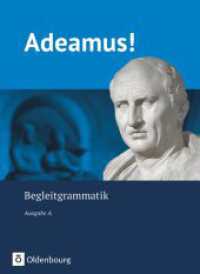- ホーム
- > 洋書
- > 英文書
- > Philosophy
Full Description
How do you know the world around you isn't just an elaborate dream, or the creation of an evil neuroscientist? If all you have to go on are various lights, sounds, smells, tastes and tickles, how can you know what the world is really like, or even whether there is a world beyond your own mind? Questions like these -- familiar from science fiction and dorm room debates -- lie at the core of venerable philosophical arguments for radical skepticism: the stark contention that we in fact know nothing at all about the world, that we have no more reason to believe any claim -- that there are trees, that we have hands -- than we have to disbelieve it.
Like non-philosophers in their sober moments, philosophers, too, find this skeptical conclusion preposterous, but they're faced with those famous arguments: the Dream Argument, the Argument from Illusion, the Infinite Regress of Justification, the more recent Closure Argument. If these can't be met, they raise a serious challenge not just to philosophers, but to anyone responsible enough to expect her beliefs to square with her evidence.
What Do Philosophers Do? takes up the skeptical arguments from this everyday point of view, and ultimately concludes that they don't undermine our ordinary beliefs or our ordinary ways of finding out about the world. In the process, Maddy examines and evaluates a range of philosophical methods -- common sense, scientific naturalism, ordinary language, conceptual analysis, therapeutic approaches -- as employed by such philosophers as Thomas Reid, G. E. Moore, Ludwig Wittgenstein, and J. L. Austin. The result is a revealing portrait of what philosophers do, and perhaps a quiet suggestion for what they should do, for what they do best.
Contents
Preface
Introduction
Part I: The Dream Argument
1. Descartes on dreaming
2. Stroud on dreaming
3. Stroud vs. Austin
Part II: The Argument from Illusion
1. The argument
2. Shortcomings of the argument
3. Why is the argument so appealing?
4. From the argument to skepticism
5. Back to dreaming
Part III: The Cure and Beyond
1. Moore
2. Wittgenstein
3. Beyond
Appendix A: The infinite regress of justifications
Appendix B: The closure argument
Bibliography
Index







